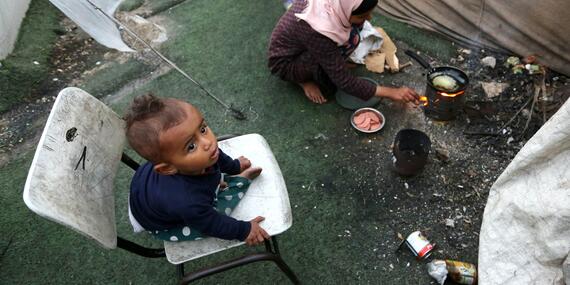Today's top news: Occupied Palestinian Territory, Chad

Occupied Palestinian Territory
The heads of UN and other aid agencies said in a statement that there is no safe place there – with diseases rampant, famine looming, water at a trickle, basic infrastructure decimated, and food production at a halt.
The group, the Inter-Agency Standing Committee, said yesterday afternoon that Rafah has become another battleground in this brutal conflict. Further escalation of violence in this densely populated area would cause mass casualties and could also deal a death blow to a humanitarian response that is already on its knees.
The group stated that needs now include an immediate ceasefire, the protection of civilians and their infrastructure, and the immediate release of hostages. They also called for reliable entry points that would allow us to bring aid in from all possible crossings, including to northern Gaza.
Amid ongoing intense bombardment of the Gaza Strip, as well as ground operations and heavy fighting, the aid community is doing everything it can to provide food, health care, and other life-saving assistance to civilians.
On Tuesday, one of our humanitarian partners, World Central Kitchen, delivered at least 39,000 meals in Rafah – and the previous day, they provided at least 173,000 meals in Rafah, Khan Younis and Deir Al Balah. But food stocks are running low, and future deliveries are in jeopardy if the Rafah crossing remains closed.
Since the escalation of hostilities on 7 October, humanitarian partners have delivered partial shelter assistance and other non-food items to some 900,000 people. Last week, our humanitarian partners reached displaced people sheltering outside UN sites in Rafah with nearly 8,000 bedding items and 1,600 sealing-off kits used to weatherproof shelters. Thousands more tents and other supplies are in the pipeline.
In areas south of Wadi Gaza, during the first half of February, 25 humanitarian missions delivered more than 450,000 litres of fuel. This was out of 42 planned missions that required prior coordination and facilitation by Israeli authorities.
However, to areas north of Wadi Gaza, just two of 21 planned fuel missions by humanitarian partners were facilitated by Israeli authorities during the first two weeks of February, resulting in the delivery of 38,000 litres of fuel. Unfortunately, all 16 planned fuel and assessment missions to water and wastewater pumping stations in northern Gaza were denied access.
Sigrid Kaag
Sigrid Kaag, the Senior Humanitarian and Reconstruction Coordinator for Gaza, is in Amman where she met today with the Chairman of the Joint Chiefs of Staff of the Jordanian Armed Forces, Major General Yousef Al-Huneiti. They discussed the implementation of Security Council Resolution 2720, including Jordan’s support to humanitarian operations in Gaza.
Chad
Food security and nutrition situation is worsening across the country due to the effects of climate change, insecurity and the rise in food and fuel prices.
The Government declared a country-wide food security and nutrition emergency on 15 January, according to the Cadre Harmonisé, a national assessment.
The assessment also says that the number of food insecure people during the upcoming lean season, between June and August, could reach 2.9 million people – or 17 per cent of Chad’s population. That’s the highest level in 10 years.
According to the same document, more than 2 million people are already experiencing high levels of acute food insecurity – IPC phase 3 and above – in the country.
As we mentioned earlier this week, Chad was among seven underfunded humanitarian crises to receive new funding through the Central Emergency Response Fund – with $15 million allocated for the country. But additional funding is urgently needed to respond to the situation and avoid a further deterioration.
Our 2024 Humanitarian Response Plan for Chad is being finalized and will be announced soon.
